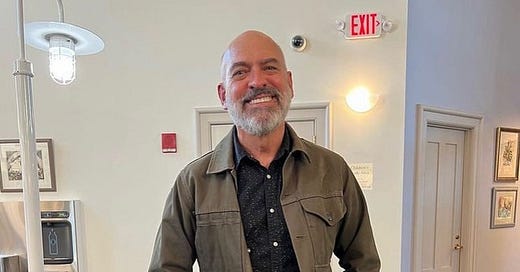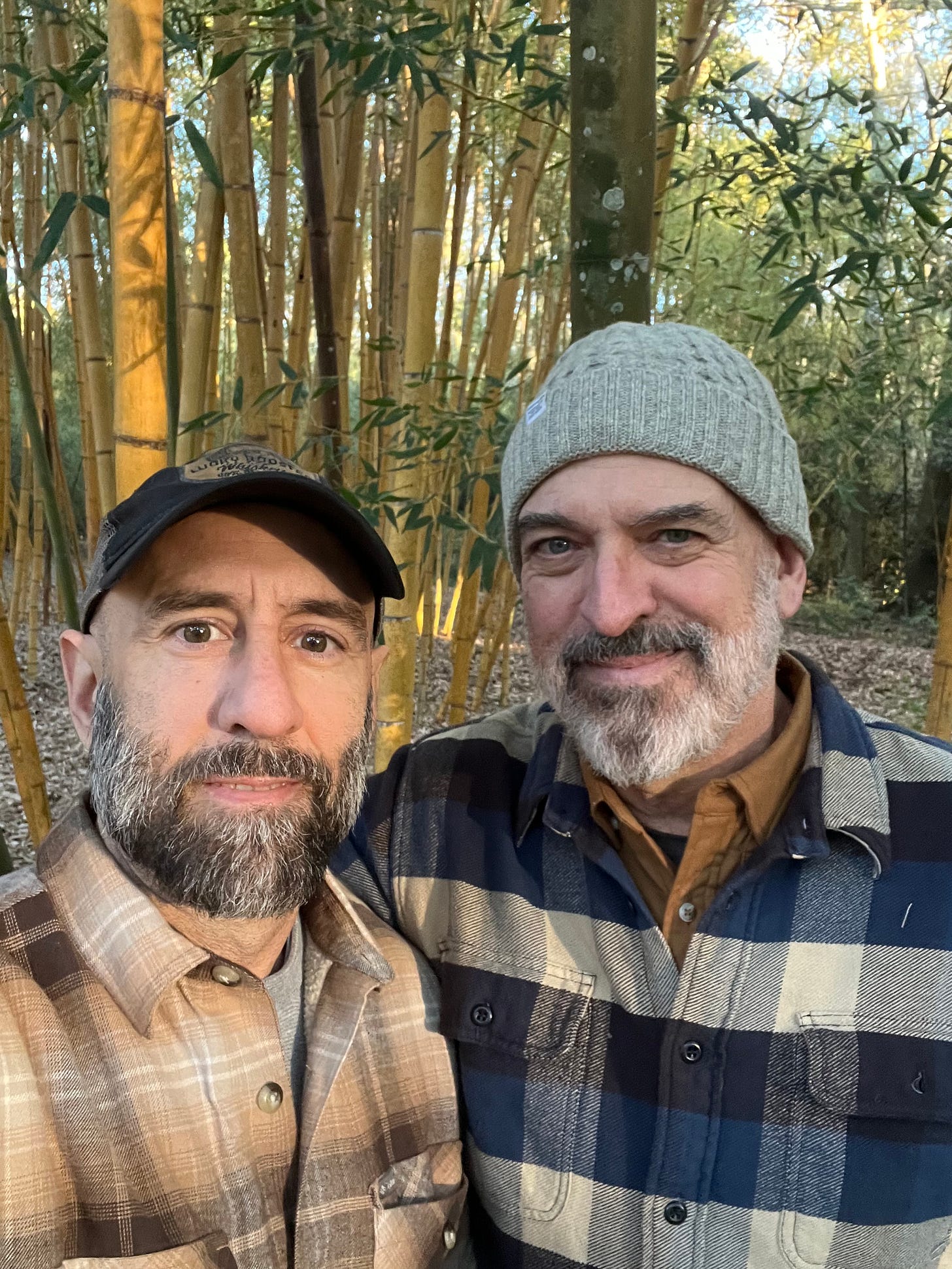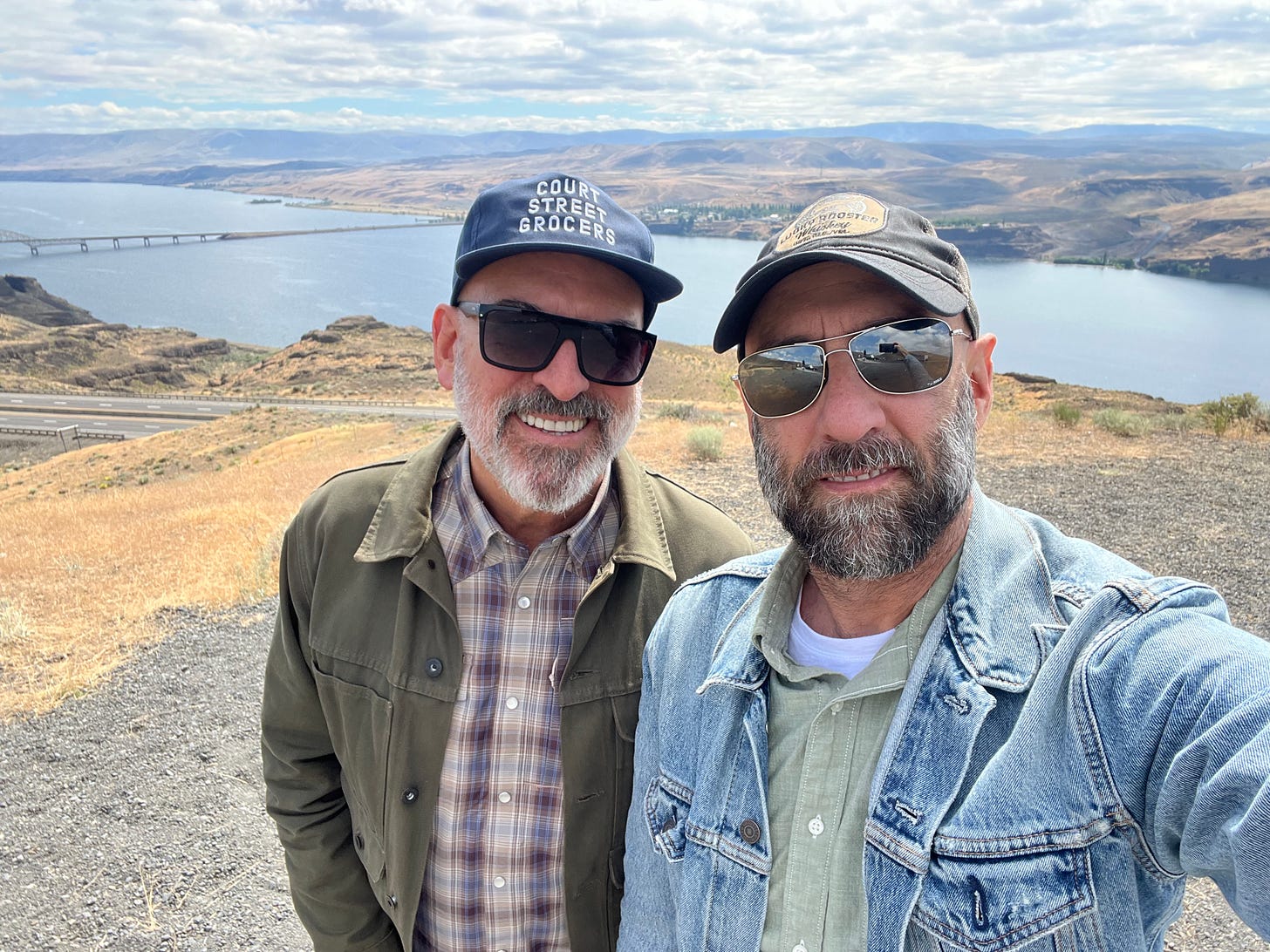The QLP Questionnaire: Paul Lisicky
"Life demands so much patience of us—it’s ridiculous. I don’t think there’s all that much to control it unless you force a relationship, and I think people do that all the time..."
Email us at queerloveprojectsub@gmail.com to take “The QLP Questionnaire.” Plus, find out how to submit your essay to The Queer Love Project.
We pay our contributors, so your subscription and support is valuable! Thanks for reading.
I’m the author of seven books, including Lawnboy, The Narrow Door: A Memoir of Friendship, and Later: My Life at the Edge of the World. My latest book is Song So Wild and Blue: A Life with the Music of Joni Mitchell, which is out now from HarperOne.
I’ve taught in the writing programs at Cornell University, NYU, Sarah Lawrence College, and the University of Texas at Austin. I’m currently a professor in the MFA Program in Creative Writing at Rutgers University-Camden, where I edit the journal StoryQuarterly.
I split my time between Brooklyn and southern Louisiana. Aside from writing, my interests include animals, mapmaking, and music.
What is your age, where in the world do you primarily live, where did you grow up?
I live in Brooklyn and grew up Cherry Hill, New Jersey, to the east of Philadelphia. I’ve lived all over, but mostly in New York City and Massachusetts. I’ll save the first part of your question for later.
How do you define yourself on the LGBTQ+ spectrum?
Gay, though I wonder if I would have defined myself differently if I’d been in my teens or twenties now.
What is your relationship status?
Long term.
Do you have an “ideal” relationship status?
Long term.
1What is the biggest misconception about being single or in a relationship?
I think there’s still an idea that being in a relationship telegraphs your desirability. I’m talking about the social currency of a relationship—even among LGBTQ+ people.
When was your first intimate moment? Was it with someone you liked? Did you feel pressured into it?
It was with my high school friend Albert (not his real name). There really wasn’t much transitional space between friendship and our sex life, which was pretty intense and became complicated quickly. One night, we were in the backseat of his car, down a country road. I remember a cop shining his flashlight in at us, and we didn’t stop, we couldn’t. Thank god that cop drove on.
How would you define love? Is it the thing you work at for a long period of time? Or is it the strong feeling you feel for someone right from the beginning for no reason
This is a whole book, and I think it’s probably something that shouldn’t have a fixed answer, but should keep revising itself over the course of a life. It’s meant to stay in question form. But maybe that’s too easy.
I think it’s a lot of things at once. It’s a rush of affection when they walk into the room. It’s thinking through an idea together, building off each other’s observations. It’s being open to someone’s advice. It’s trusting them to the point where you’re giving them space, allowing them to be an independent person with an independent life—you’re not following them around in your imagination. It’s cheering on their aspirations and wins. It’s being open to their love, without trying to control or dampen it. It’s sharing the same space, quiet, at rest, holding hands, not feeling the need to cover up the silence with your voices. That’s only a beginning.
Does the relationship fill your deepest needs for closeness with a person? Or do you prefer not to share every part of yourself?
I’m wary of the “deepest needs” part. It sounds absolute. Already it suggests pressure, and, decades ago, I probably crushed a fledgling relationship or two, expecting too much of it.
When did you come out to family, friends and others for the first time?
I was in my late teens.
Did you have any LGBTQ+ role models as a child or teenager? What do you remember about images of same-sex or queer relationships or messages you gleaned?
When I was in my late teens, the only visible role models were on the cover of porn magazines. They seemed so beautiful, full of life, and embodied at a time when the culture was out to crush them on multiple levels and AIDS was mowing them down. Al Parker, for instance. He seemed so casually smart and sexy and down to earth. And I sensed he had a much larger and more complicated life than those pictures alone.
Are there any pivotal pop culture moments that you credit for teaching about love and/or relationships?
I’d say it was Joni Mitchell’s songs, which always took pains to represent contradiction, light against dark, hope against despair.
Do you have a Chosen Family?
I have people in my life that I think of as siblings, but I wouldn’t use that term. I respect that concept, though.
What is your relationship with your biological family (if any)?
My mom and dad are no longer around, but I have two brothers. We don’t see each other all that much these days, but we’re in texting contact every day.
What do you (did you) like about dating as a LGBTQ person? What do/did you dislike?
I grew up at a time when sex was probably over-emphasized. The thought was, if you weren’t sexually compatible instantly, then why bother? But if you’re really attracted to someone it can take some time for the parties to figure out how to connect outside of the realm of detached, athletic sex. That pressure made going out to dinner or a movie feel tidy and polite and nervous-making to the point of boring. I probably didn’t give some early dates a chance because there was too much expectation attached to sex. That’s not to say I wasn’t into it most of the time.
Has race, ethnicity or cultural differences been a factor in who you seek out?
I’ve had boyfriends across the racial spectrum, but I never remember thinking, “I’m attracted to [insert category] guys. I’m going to seek out an [insert category] guy.”
Have you had any difficulties dating or finding/keeping a relationship?
I remember going through long periods, as recently as 10 years ago, in which I wasn’t clicking with anyone, then someone would come along and there’d be excitement. Then hope would turn quickly to disappointment. I thought there was something wrong with me, but honestly? I hate to say it, so much of life is about luck—right place, right time, in all ways. It’s very humbling, and I know it’s a cliché.
Life demands so much patience of us—it’s ridiculous. I don’t think there’s all that much to control it unless you force a relationship, and I think people do that all the time against the fear of being lonely.
What’s the most surprising thing you have learned about relationships from your perspective?
They’re never static. We all change in a life, and change is compounded when two people are together. It’s important to expect change and pay attention to it, and not be afraid.
Have you experienced heartbreak?
Yes. It took years.
How would you term your sexual relationship with your primary partner? Has that changed over time?
It gets better the longer we’re together—that’s three-and-a-half years.
Are there any things that standard heterosexual relationships have that you feel are out of reach or that you wish you had or could achieve?
I’m so glad I’m not straight.
Have you ever been in a polyamorous relationship or would you like to be in a situation that doesn’t involve just two people?
I downloaded Feeled some years ago, but I never filled out the account information or posted a photo. At the time, I thought, maybe this takes some pressure off the idea of a couple, but I think if I were really compelled, I would have given myself over to it.
Three people together—that’s a lot of psychic need to manage, though I do have friends and former students who have in been in polyamorous relationships for years, and happily.
Are you married? Have you ever wanted to be?
I married my ex about a dozen years after we’d been together as a couple. What I didn’t see is that marriage can be freighted for some. I think two people have to want to do it fully or else it’s going to collapse the relationship.
Have you had a difficult time navigating the “roles” you should play in a relationship?
It’s very hard work not to take on the examples of parents even when you think that’s the last thing you’d want to do.
What is your philosophy about relationships?
I really don’t have satisfying language for this, but I think there’s a spirituality embedded in the idea of two (or more) people being together, attending to each other, and turning themselves out toward the world.
Any good/bad advice you received from a friend or queer elder?
I remember a friend telling me that, in order for a relationship to work, two people must want the same thing. I think that to a certain degree that’s true, but I’m not sure that that’s exactly possible as we change all the time, and maybe that divergence keeps the two parties awake. A relationship isn’t a suit you step into; you can’t expect it to do all the work for you. It’s a pact that should keep you active, questioning.
Any advice you’d give to someone younger than you who thinks it’s impossible to find love?
I’d say to be patient, but if I’d heard that as a younger person, I would have shaken my head. So much of young queer life feels like it’s about catching up, throwing off shackles, reclaiming oneself, and who wants to wait? I think it’s important to think about a search for love in the broadest sense.
Ideally, it’s a stance toward life, toward your friends, family, co-workers, the people you walk by in the supermarket aisle. You put it out there, but it’s not going to be transactional, or quid pro quo, and it’s not going to come in any way you expect.
And now I’ll say that I turned 65 in the last year, which makes me self-conscious, if only because those numbers make me sound like an elder, and I don’t want the baggage that comes with that designation when it feels like my life is just beginning, in all ways. If we could all find ways to subvert the cultural cargo of age across our lives then we’d be truly queer.
Paul’s latest, Song So Wild and Blue: A Life with the Music of Joni Mitchell, is available now.
BONUS:
We all need more inspiration. Recommend something that influenced or helped shape you significantly that you’d recommend to someone else.
Books: One of the first books I really loved was Jane Bowles’ Two Serious Ladies. I didn’t even realize that the characters were queer, until years later, because none of them use standardized language. But the non sequiturs, the comedy and vulnerability. Somewhere Millicent Dillon talks about the interrelationship between ridiculousness and mysticism—that strikes me as absolutely right.
TV Show: I wonder how the show Mary Hartman Mary Hartman holds up or whether it was an artifact of its age (1970s). Something very queer about its absurdity.
Movie: As a young person, I loved all the early John Waters’ films for their outrageousness, anarchy, satire, darkness, trashiness, style, and joie de vivre. They still make me laugh out loud.
I loved Robert Altman’s early movies, too. 3 Women? Oh my god.
Song: Any song by Joni Mitchell, Laura Nyro, Björk, Kate Bush, and Tori Amos.
Play, Musical, Other Cultural artifact: All of Sondheim’s musicals actually. But Company? “Being Alive? I can’t think of a better statement of queer longing (see Stacey D’Erasmo’s reading of the song in The Long Run), though it pretends to be something else.







¡Bravo, Paul!